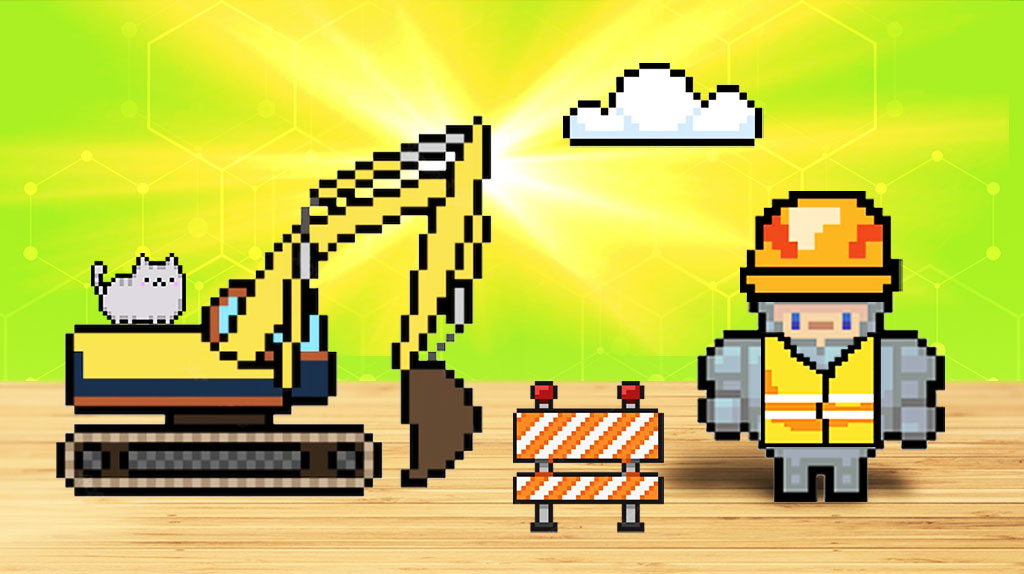Audit Checklist for Dramatic Ranking Drops in Google
Join the 1,000+ brands that trust us for their link building.
“My Google rankings dropped dramatically! What? No!” Have you experienced this sense of panic and confusion after waking up one morning, having your first sip of coffee, and logging onto your favorite rank tracker like Ahrefs (or one of the several free Ahrefs alternatives), only to notice that one or more of your web pages took a major hit in Google’s search results?
Maybe you didn’t check your rankings in weeks, or months, and noticed your organic search traffic is dead (haven fallen off a cliff a while ago). We completely understand the feeling — You just found out (probably for the first time in your SEO career) that your Google ranking dropped dramatically and now you’re unsure about what to do next.
Don’t fear! Our guide on how to deal with a Google SERP rankings drop will teach you how to address key issues from a holistic perspective and provide SEO tips on how to improve your own website to safeguard against Google penalties in the future. After reading this article (which is based on our extensive experience of dealing with Google rankings dropped by Google penalties), you will understand that there is always a way to diagnose the issue and make sure that, with a well mapped out plan, you can get your site’s rankings, lost backlinks, and organic traffic back in shape.
Please keep in mind that, although we consider ourselves SEO experts, we do not claim to understand exactly how the Google algorithm(s) or Google updates work. We are simply offering our best advice on how to deal with a drop in your Google search engine results page rank(s).
Having said that, let’s continue with the guide.
An Opportunity To Improve Your Site
Almost everyone with a serious website will experience a Google penalty at some point in time. This penalty will either be delivered automatically by web crawlers (i.e. an “algo slap”) or it’ll be a manual penalty, in which case you’ll have to refer to the Google Search Console data for further guidance.
Google algorithm updates are released on a regular basis. It’s not so easy for an everyday SEO, let alone someone who isn’t knowledgeable about the industry, to keep track of all the changes to the ranking methodology and how those changes positively or negatively affect websites (other than the general-purpose publicly stated by a Google spokesperson). There is always a lot of discussion/debate in the blogosphere / SEO news sites whenever big, new Google updates come out and webmaster’s linking websites (usually spammy sites) get hammered left and right in the search engine result pages.
Assuming the temporary, dramatic google ranking drop won’t harm you or your organization too much, experiencing a drop in your Google rankings can be viewed as a constructive opportunity to learn more about the industry and ways to improve the security of your digital marketing assets in order to get your website rankings back in proper form.
The Google algorithm(s) that instruct search engine crawlers on how to analyze sites’ content has a list of seemingly countless variables it bases site health on (which are refined by a regular Google algorithm update). If you get a sudden Google rankings drop, there are some great starting points and simple SEO tools available to you. If you start looking in the right places, the “impossible” task of recovering your Google rankings may not be as daunting as you think.
We are going to discuss important health/security aspects of an entire website such as on-page optimization, link building (inbound links & external links), lost backlinks, site content, negative SEO attack(s),
Now let’s dive into our favorite things to audit after your site(s) experiences a drop in rankings:
Manual Actions
Google has guidelines that webmasters must follow in order to keep their sites healthy and moving up in their SERPs. Sometimes these webmasters do things that are deemed tricky by Google (like trying to manipulate their Google rank), and the website URL gets slapped in the Google rankings.
The great thing about checking if you have a manual penalty is that it’s very simple to diagnose because Google provides you with a web portal to help resolve the issue.
All you have to do is check Google Search Console and scroll over to the Security and Manual Actions tab.
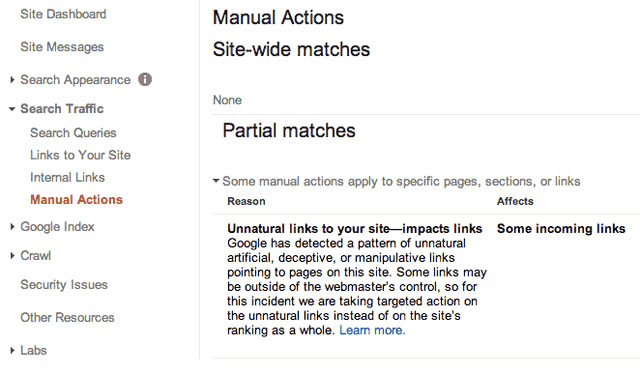
What you want to see here is a message that says, “No Issues Detected.”
If you happen to be one of the unfortunate people affected by a manual action listed in Google Search Console, then it will read differently depending on exactly what about your site Google determines to be breaking the rules of their general Webmaster Guidelines or a Google algorithm update. This can range from using unnatural link practices (e.g. user-generated spam, spammy links, over-optimized anchors) to having too much duplicate site content.
For a full list of manual actions, click here.
The good news is that Google themselves will show you steps on how to address the issue and fix your own site. However, you aren’t guaranteed a timeline of when your site will completely recover from its ranking drop in the search results.
If you end up with a manual action, it’s probably a good idea to rethink the way you are doing SEO, focus on best practices, and playing the game a little bit safer / smarter.
Algorithm Updates
Every once in a while, Google will roll out a core algorithm update that really shakes up the SERPs and updates what exactly Google wants to see top-ranking sites have (or not have) in its search results. This may cause sudden ranking drops in Google.
These are easy to check for, but diagnosing exactly what happens to your website after an algo update takes a little bit of exploration (and is a true test of search engine optimization skills).
My favorite tool for checking on real algorithm updates, or overall SERP volatility, is Algoroo. But checking Google news for terms like “Google algorithm update” will yield results as well.
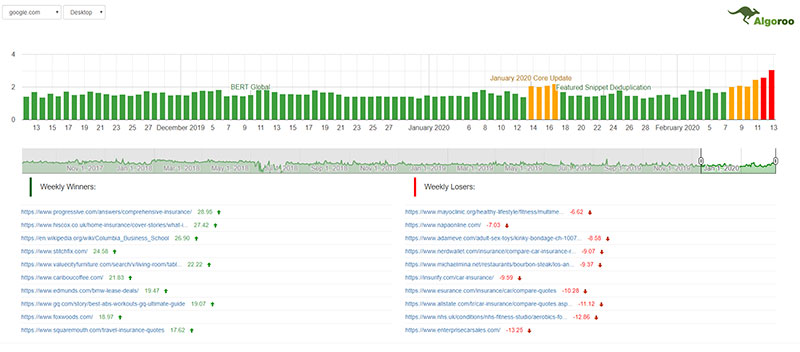
It also helps to be in trustworthy SEO groups or digital marketing forums where people discuss Google search engine updates, share incidences of their own search engine rankings dropping, and present possible solutions to address any issues.
Bouncing ideas off one another in a place like the SEO Round Table (the Facebook group of our digital marketing agency) is a quicker way of getting your Google penalty issue diagnosed/resolved than just combing the search engine results pages yourself in an attempt to find an article that you trust. Multiple people, who we have vetted, will be discussing niches and other variables affected in the latest Google rankings updates.
Like manual actions, you can always recover from a Google rankings drop caused by an automatic algorithm update once you correctly diagnose and fix the problem. However, it might take considerably more time to evaluate the problem and discover possible solutions. This is because Google Search Console may not necessarily indicate that you have received a Google penalty.
Google Search Console is usually reserved for webmasters to check on manual penalties, in which any resolutions you enact must be audited by someone working for Google before your site can recover in the search results.
Algo slaps delivered by Google search crawlers (that are guided by the latest algorithm update) happen behind your back when you’re not paying attention. You cannot just check Google Search Console for a clear-cut solution. So how do you know if you have an algo slap? You must check your rankings and website traffic on a regular basis (either with Google Analytics or some other SEO tool) to see if there have been any sudden changes in organic traffic, lost backlinks, keyword rankings, or your pages’ Google rank.
If you notice your search traffic take an unexpected nosedive and flat line over days or weeks — there’s a good chance you have one or more penalties.
You have to assess how your site(s) is misbehaving in relation to the most recent algo updates, make adjustments, and wait for the next Google search crawler to come around and audit your site again. The good news is, if you made acceptable changes, your Google penalty will be automatically lifted and your site will hopefully start regaining some of its lost organic traffic and SEO rankings.
When we feel that an algorithmic penalty exists, one of the first aspects of a target site we look over is its structure and content:
Site Structure and Content
At times, you might get anxious about your content, the way your site looks, your URL structure, your schema, or other on-page factors.
Every time you change these things, you alter the way your site is being crawled and understood by Google’s search engine bots. Ask yourself:
- Did I change the way the site structure is set up?
- Did I alter the inner-page URLs, title tags, meta descriptions, etc?
- Did I make changes to the site’s content that could affect things like niche keywords density or topical relevance?
These things can have serious effects on how Google ranks your site in the search results since they are some of the most important factors for on-page SEO. If you made good changes to your portfolio of linking websites, then you may expect to see your rankings resonate favorably in search engines. However, bad changes (such as keyword stuffing meta descriptions) may likely produce the opposite effect and you might incur a rankings drop.
Depending on what you did to your site, you might just take a short-term rankings drop and come back up naturally (if you did things properly). For this reason, it’s worthwhile to let your search results rankings settle over the next few weeks before freaking out and changing your website back to how it was before the ranking drop.
Hacked Sites
So your site has gone blank, your rankings in Google fell off a cliff, and your site’s title now reads, “PwnD by MasterHx6969.”
Or maybe they were less obvious, and you just noticed a random IP has been digging around your website. Either way, you can be sure that the hackers, who may or may not be SEO experts, are up to no good. You’ll need to step up your security game quite a bit going forward.
These simple security fixes can range from installing the right plugins to making sure your username and passwords are strong and unique.
If your site has been hacked, then all you really need to do is install a backup file of your site and change your password. Your hosting provider will usually have a copy for you (depending on the host, they sometimes charge a small fee).
This will reverse any changes the hackers may have made that could have caused your rankings to drop. If you/your host didn’t have your site backed up, you will need to look for these changes yourself.
You can also check Google Search Console periodically as they have a section under the Security and Manual Actions -> Security Issues tab that will give you details on malicious actions taking place on your website that you may be unaware of.
NoIndex
There are a couple of ways to encourage search engines to ignore a website, and it’s something worth checking for as it could be a quick fix to your Google ranking drop if they were accidentally done.
In WordPress, there is an option to do so, and a good tutorial on auditing these settings can be found here. It also goes over reviewing your Yoast settings (if you are using that plugin).
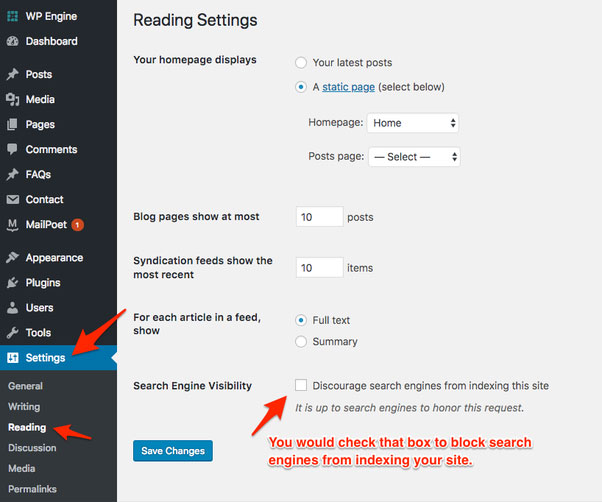
There are also a handful of plugins you can use to check the status of a page – Robots Exclusion Checker is a good one for Chrome Browser and can be downloaded here.
WordPress Updates
Maybe WordPress just updated to the latest version, or you went ahead and updated WordPress, 13 plugins, and 3 themes all at the same time. You then go to check on your site, and it’s a literal mess.
The idea is for WordPress to work cohesively with everything you attach to it, however, the reality is that all these moving parts are made by different developers and they don’t always work together perfectly.
Should you update a lot of things all at once and get an issue where your search results rankings start to dwindle, it’s probably best to go in and deactivate each plugin you have activated and reinstall each one while simultaneously checking that your site is working properly.
Eventually, you’ll find the culprit that’s been hurting your site and rankings.
Losing Backlinks
Maybe a year ago your site had some awesome press, but today those sites have decided you are no longer relevant. Now, they’ve taken your link away or moved it far into an inner page.
Although losing links is natural (which is why we always preach continual link building), and we don’t think you lose all the juice from a lost link, losing backlinks can still hurt your rankings and organic search traffic if you lose too many that were propping the site up in search engines.
Google wants to see a healthy site that is continually getting spoken about (linked to) and found by users. Essentially, it needs to know that the site is relevant and popular enough for being shown in the SERPs. How many links per day or month were you adding?
You can use a backlink auditing tool like Ahrefs (or an Ahrefs alternative) to figure out if you may have recently lost some links that were packing a punch to your website’s rankings.
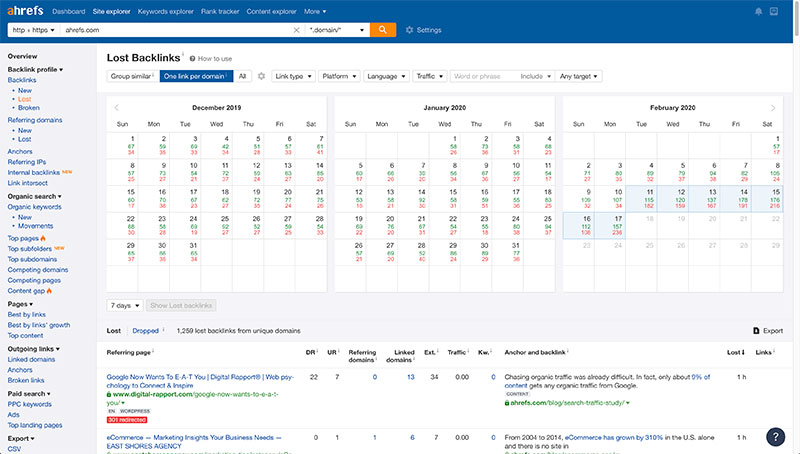
Something else to consider is 301s and other types of redirects that may have been broken or just stopped redirecting properly. This can affect your rankings as well and is worth looking into if you have ever done a redirect to the site in question.
Did you recently disavow a bunch of links through Google Search Console? You may have accidentally mistaken a link that was giving you power as a spammy one. We recommend only doing disavows as a last resort – and really only if you understand what makes a good backlink before building a disavow file on your own.
Anchor Text Over-Optimization
Have a look in Ahrefs at the “Anchors” tab and make sure your anchor profile is looking nice and natural. We typically want to see more branded, naked, and generic anchors than money anchors. An anchor profile with too much obvious buyer’s search intent language doesn’t look natural. Smart usage of anchor text is part of building a strong backlink profile.
Be sure not to keyword stuff your anchors too much as you engage in link building activities. It’s tempting to want to improve keyword rankings by trying to rank for as many keywords as possible. Anchors should be blended pretty naturally, and over-optimized anchors (especially with money terms) are an easy way for Google to tell if someone is attempting to game their ranking system. This also seems to be growing more important as time moves forward.
If you see a ranking drop and feel over-optimized anchors are the culprit, we recommend using more branded, naked, random, and long tail anchors to dilute your anchor profile. This is fairly simple to do if you are buying backlinks but can be done over time naturally as well.
Spammy Links
Another thing you can check for with a tool like Ahrefs is spammy links. These links can take many different forms (such as the links created when doing churn and burn SEO), and sometimes deciding what is spammy is not that easy to do.
A rule of thumb is to check the way the site looks and reads (although looks on their own aren’t enough). Does the site/page serve a purpose? Sites can serve all sorts of purposes, but you can typically tell if something looks like it doesn’t.
Maybe the link is surrounded by disjointed spun content, originating from user-generated spam, or maybe the site itself is just uninformative text linking out to all sorts of random low-quality sites.
Spammy links can cause a ranking drop, and should you find them the best way to remove them is to do a disavow (will take some time to recover). We recommend only doing this if your site is experiencing negative effects and you are 100% sure the links are indeed spam and are causing the problems. A strong backlink profile is crucial for maintaining your rankings in the long run.
Make sure not to disavow good links like guest posts or editorial links!
Too Many Non-Relevant Links
Link relevance is very important (though not necessary for every single backlink you get). It can seem unnatural to Google if your site gets too many non-relevant links.
If your site is about pets but almost all your links come from video game niche forums, this can hurt your rankings over time. A site that’s about pets should be getting links from other sites or pages that are somehow related to pets.
The practice of building non-relevant links may work for a while, but eventually, Google won’t see your site as relevant in its niche and will start to devalue it in the SERPs.
If your link building practices are more about getting random juice from anywhere and any type of site, then try getting more niched-down links and see if that helps the situation.
You can also check out our case study on recovering from bad links.
Negative SEO
Some niches are extremely competitive, and the practice of using malicious links against competitor websites is very real.
One day you’re sitting comfortably at the top, and the next day a plethora of targeted links hit your site with over-optimized anchors from shady sites.
If this happens, you will want to submit a disavow file to Google to remove the incoming links. The frequency you will have to submit them will depend on the frequency at which you are being attacked.
DDOS attacks are also fairly prevalent as well. These attack your host’s resources in order to slow or crash your site. You can upgrade your hosting security or even use a content delivery network like Cloudflare to help protect you from attacks.
Excessive 404s and Inaccessible Pages
Check your site to make sure all of your pages are accessible, loading, and responding properly.
Plugins sometimes update automatically and cause internal conflicts. These conflicts could end up causing 404s or other errors that prevent pages from displaying properly to users as well as Google’s bots.
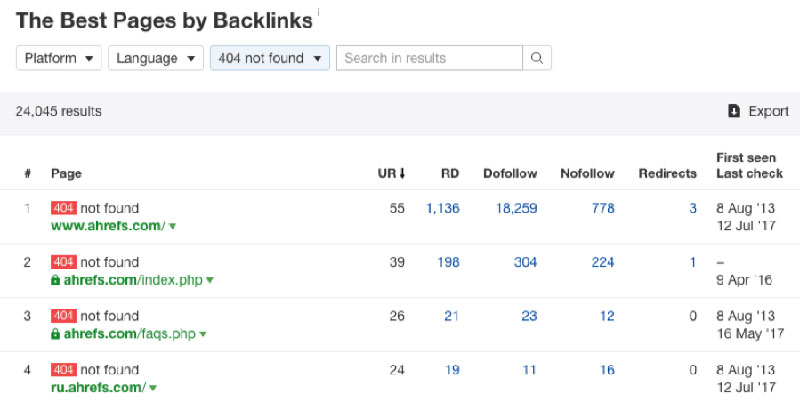
You can check this by loading a random sample of pages manually or with a tool like Ahrefs. Google Search Console will also show this information under the Crawl -> Crawl Errors tab.
Stiff Competition
Maybe you got into a good niche early on, but now the word is out and the competition is starting to catch up (or even beat you).
If you need guidance, always look at what the top sites on Google are doing and base your new ranking approach on the information you gather.
Check the quality of their content, site structure, backlinks, and anything else that might cause them to outrank you. If you’ve been slacking in any of the areas they’re beating you on, then start putting energy into revitalizing them and gaining ground on the competition.
Duplicate Content
Duplicate content is content that appears elsewhere on the internet and should be avoided at all costs. Google doesn’t like websites that appear to have copied content from others.
If you outsourced your content, then it’s important to use a tool like Copyscape to check if it was plagiarized from somewhere else. If duplicate content is found, then replacing the content with well-optimized, unique content should help get your rankings back in time.
Some sites may get away with duplicate content for a while, but it can very likely lead to a Google ranking drop.
Low-Quality Content
Look at the top pages in the SERP you are going after. If you’re targeting an American SERP, is a 5,000-word article written by a non-English speaker in the top 3? If you’re in a worthwhile niche, the answer is most likely no.
Don’t skimp on content. Using low-quality content is not only going to affect rankings, but it will affect the overall user experience as well.
Your content should be well-written and unique. We advise staying away from auto-generated content, spun content, and non-native content that’s packed with errors.
Natural Fluctuations
If you’ve just noticed a drop in rankings on Google and it’s only been happening over the last couple of days, you need to let time pass to really understand what is happening to your site.

Fluctuations in SERP positions are common and occur for a multitude of reasons. It’s important to stay calm, be analytical, and let things work through themselves and settle before making any extreme decisions.
Acting too quickly could just cause more uncertainty and problems!
Dramatic Google Ranking Drops Can be Fixed!
So your Google ranking dropped dramatically (maybe for natural reasons, maybe not), but the good news if you audit your website properly, you should be able to find and address the issues that are negatively impacting your organic search traffic and rankings.
If you aren’t sure about what you’re doing, make sure to join a community such as our Facebook Group and ask questions. If you aren’t experienced in SEO, you definitely don’t want to cause more problems than you started with.
Remember that no matter how damaged your site is, there is always a way to fix the issue you are facing and keep moving forward.
 Article by:
Article by:
Nicholas Altimore
Hey I'm Nick, the Founder/Director here at SirLinksalot. I have a passion for building online businesses and taking websites to the next level with the help of my amazing link building team.
 Questions or Comments?
Questions or Comments?
We are active in our Facebook Group seven days a week and would love to hear from you. Ask us questions, learn from other group members, and share your knowledge.
Related Posts
Ready To Start Building Your Rankings?
Your link building journey to the top of Google starts today!
Apply for Managed Link Building to get a free analysis and game plan, or order backlinks a la carte.
Link building services that work.

